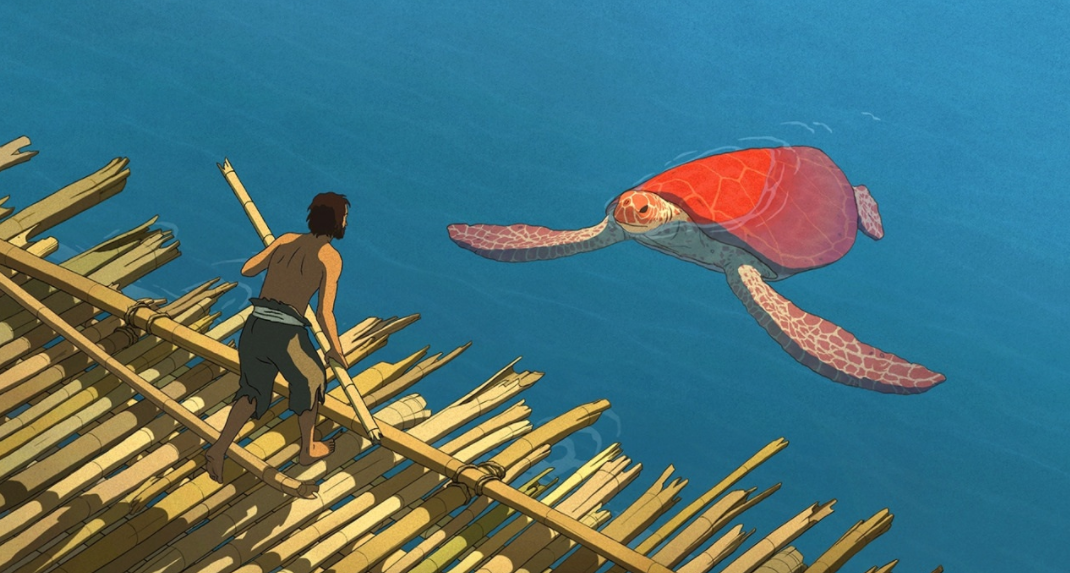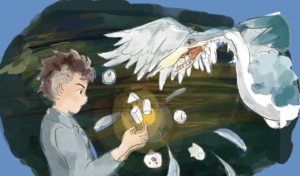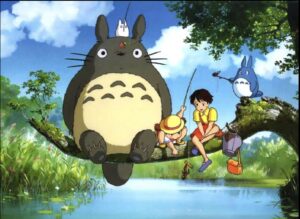In the beginning, you hover above the turmoil of dark, crashing waves and are thrown under the moving ocean. You watch a bearded man desperately try to claw his way back onto his diminutive boat until he slips into the abyss. You too are the man at times, with saltwater obscuring your vision and rushing down your throat. The sea is everywhere until the camera mercifully cuts to the man dragging his body onto an island, exhausted, defeated, and alone.
It is on this deserted island that the strange, evocative, animated film The Red Turtle unfolds. A collaboration between the Japanese film studio Studio Ghibli, responsible for the classic films My Neighbor Totoro (1988) and Spirited Away (2001), and the film’s director Michaël Dudok de Wit (an Oscar winner for a 2000 short “Father and Daughter”), Turtle condenses half a lifetime into a succinct, understated, and moving hour and twenty minutes. In spite of its short and sweet runtime, it feels neither rushed nor sparse; rather Turtle manages to retain more intimacy and significance than the average Hollywood biopic. Even still, it remains supremely difficult to capture this gift of a film, which premiered in the Un Certain Regard section at the 2016 Cannes Film Festival, in a short review.
First, the film deals almost strictly in its perfectly animated images. There is no dialogue and no vocalized sound save for the occasional cry of anguish or bubble of laughter. It is an exercise in the purest of cinema; each shot is simple, purposeful, and artfully drawn. The man’s nuanced movements seem more real than those of a human actor; the ocean is colored in soft gradations of blue, green, and yellow; the stars are flecks of sand on a matte sky. Save for one dramatic incident, events unspool without exaggerated fanfare even as the film shifts into allegory. The gift of animation is that a film can easily flirt with the boundaries of the unreal. Turtle does this while simultaneously grounding its drawings in reality. In a joyous scene, the man soars over a bamboo bridge that has materialized over the ocean to Laurent Perez Del Mar’s versatile score, only to wake up still stranded. In this way, the magical and the real collide.
Perhaps most impressively, The Red Turtle eludes a traditional synopsis, instead linking its bare-bones plot points with its trademark gorgeous imagery and whimsical leanings. In the first half, the man explores the island’s lush bamboo forest, befriends some wide-eyed, begging crabs (a cute animal sidekick to rival any Pixar movie), and attempts to escape on a makeshift boat, only to be thwarted by the eponymous red turtle. His despair swells, and otherworldly hallucinations haunt him; in a beautiful scene, he runs after a vanishing classical music quartet but never reaches them. His rage peaks and he succeeds in overpowering the turtle, prompting the film’s even more breathtaking second half. It is here that Dudok de Wit allows the man company and, in doing so, subtly explores themes of love and redemption with more humanity than many films starring actual humans. (Although there is no Shyamalan-esque twist, to say more would spoil the film’s unexpected evolutions.)
For a greedy audience member like me, The Red Turtle leaves you grasping for meaning that may not be there. The turtle, the isolated island, and even the act of swimming beg to be made into symbols, yet the film is so muted that the exercise seems both futile and unnecessary. It is better to wonder without baggage at a quiet moment of forgiveness, at the sweetly-rounded head of a swimming child, or at the dark pools of the turtle’s eyes.







